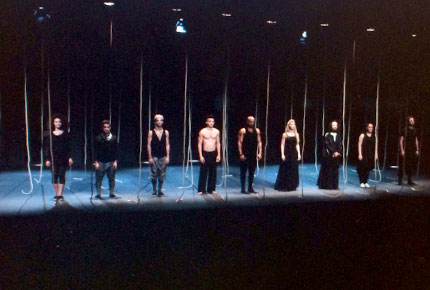Stage adaptation of Sitt Marie-Rose in revival at LAU
After a successful run at Babel Theatre, Bachir Achkar’s production of Etel Adnan’s novel comes to Irwin Hall.
“Beirut is humiliated,” writes renowned Lebanese poet Etel Adnan in her novel Sitt Marie Rose when describing the Lebanese civil war. “She suffered the defeat; she’s the one who lost,” she continues, capturing the fall of a city.
Director Bachir Achkar has adapted Adnan’s novel for the stage and it was until yesterday in its second production at LAU’s Irwin Hall, after a successful run at Babel Theatre earlier this year.
Adnan’s novel, based on a true story, tells of a Christian woman who leaves East Beirut to work with deaf children in the Palestinian camps of West Beirut. Militia men from her region kidnap her and put her through a vigilante trial that eventually sentences her to death.
“What I did in my adaption is try to make this story applicable to what’s happening today,” says Achkar. “Today we have different problems, everyone is fighting with everyone, it’s no longer Christians against Muslims. I want the audience to be able to apply the story to their own context. Sitt Marie-Rose can be any nationality depending on the audience, Syrian, Palestinian, etc…”
The play opens with the ominous presence of ropes hanging from the ceiling, foreshadowing the tragedy to come. Achkar carefully choreographs his actors through the cords, transforming the stage into different spaces and times according to how they are used. At one point the ropes become objects behind which lovers can flirtatiously hide, and at another, corridors of doom.
For four months, Achkar prepared his actors, improvising movements, colors, smells, using only the text at the final stage of preparations. “Everything I learned about theater, I learned at LAU,” says Achkar, who studied Communication Arts here and who worked for nine years on the university’s major productions. “I directed this piece using a mixture of two styles, absurd and classical. You see something visually absurd, but at the same you understand the story completely from beginning to end.”
“LAU changed who I am,” said Nayla Al-Haress, a fourth-year student, who acts in the play. “It’s the place where Bashir Achkar and also the production’s light designer, Nour Fakhoury studied. It’s an honor that the university invited us to present the play here and we hope that we are up to the challenge.”
On opening night (October 8), the audience was enthusiastic. “In terms of content and acting, it was beautiful. It embodied the role of art and theatre in reminding us of our history, so we don’t forget,” said audience member Hala Imad.
“LAU has a reputation for excellence in theater and this is a very daring play. As an educational institution, it is vital for us not only to encourage our own students and graduates, but also high quality Lebanese productions, such as this one, that carry a strong message,” agrees Samer Habre, the assistant dean of the School of Arts and Sciences.
More
Latest Stories
- Translation Workshop Widens Students’ Career Horizons
- LAU Engages High Schoolers With Creative Expression and Scholarship Awards
- How Does Digital Media Impact Our Brain?
- Community Development Takes Root at Capstone Presentation Day
- LAU Athletes Return Victorious from Athens and Belgrade
- A New Initiative Toward Harnessing Digital Transformation
- Quality Childcare is the Key to Women’s Empowerment in the Workforce
- A Cardiovascular Conference to Streamline National Expertise



